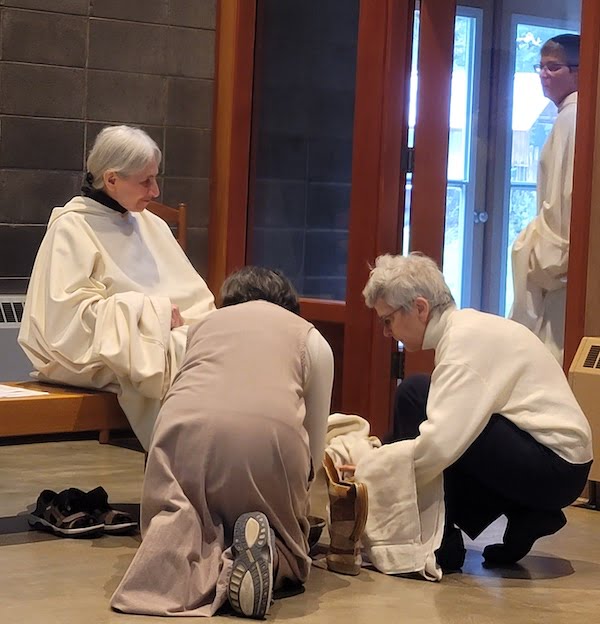Chapter Talk – Holy Thursday – April 6, 2023
What is the horizon of the mind and heart of Jesus? How would you describe it? What is the horizon of the Christian faith? These questions come into central focus on this Holy Thursday which opens the Triduum. Foundational to Christian faith is love, the primacy of love, the love of God fully revealed in Christ. Today’s liturgy focuses on two rituals: the sacrament of the Eucharist and the washing of the feet. Woven into both is the transformative power of love…love is the reality, the motivating force, behind and within these rituals, one a Christian sacrament and the other sacramental in conveying Divine love, mercy, and grace.
“The washing of the feet, the shared cup and shared bread, the cross….a single commandment of love, a single TESTIMONY. This is the testimony of Jesus…” writes Fr. Christian de Chergé, the superior of the Atlas community, in his 1994 Holy Thursday homily (A Heritage Too Big, vol. 2, p.6). It is as if Jesus, in these two events, wrote his own final testament, for contained within them is the synthesis and the culmination of his teaching, of his word, indeed of his whole life. The gift of self, the self-gift offering given totally, surrendering his will to God’s will, love, forgiving love lavishly poured out, never counting the cost, this is what these rituals are transmitting.
Two phrases from the evangelist, St. John, are the threads that weave the gospel of the washing of the feet into a program for life: “Having loved his own in the world, he loved them to the end”. “As I have done, so you must do” (Jn 13:1, 15). Loving to the end and doing as Jesus has done, these are two incarnate realities which now, as his followers, we are to embody in our lives. If we want to glimpse the horizon of Jesus’ heart and mind, here is what Chergé says: “‘Having loved his own, he loved them all to the end…’ to the very end of himself, to the end of the other, the end of humanity, of any human being, even of the one who will soon go out into the night after having taking his piece of bread, his feet freshly washed” (p.6). Loving the other, even the betrayer, this is how far love is to extend, this is how far mercy and forgiveness are to extend. This is unrequited, unconditional love, embodied fully in Jesus. This is the radicality of Christian love and forgiveness: we, like Jesus, are to go to the ‘far end’ which means there is no end to how far love and mercy are to extend. And today’s liturgy places this message in the foreground of our lives as we follow Jesus during these holy days.
Chergé will use another image ‘martyr’. He calls the testimony of Jesus the “martyrdom of love” (p.6). This is the spiritual itinerary, if we are ‘to walk as Jesus walked’ (1Jn 2:6), a ‘martyrdom of love’, or a ‘martyrdom of the heart’. Love grows, does it not, with having our heart broken open a little more each day, broken open by love’s touch of forgiveness, broken open by love’s urging for salvation, broken open by the necessity of love. If human beings are to incarnate God’s love, then it follows that our heart becomes the locus for transformation. This martyrdom of the heart happens daily, in small ways to the degree that we are present to the movements and the silent sounds coming from our heart. Ubi caritas et amor Deus ibi est: ‘where there is charity and love God is present’. Bending down prompted by love, because we have already received Divine love and mercy, to wash the feet of the other…this is how love grows. Raising our lives with Jesus as he says: ‘This is my body; this is my blood given for you’. In, with and through him we are to make this self-offering. This is the immediate and end goal of all our lives. Incarnate love happens through the wounded and fragile vessels of our lives, lives offered out of love’s prompting. Christ dwells in the ‘earthen vessels of our lives’ (2Co 4:7) and so we have a pattern of how we are to live. ‘Let your bearing towards one another arise out of your life in Christ’ says the Philippians hymn (Ph 2:5).
On the other side of self-offering is resurrected life. There is no offering of self in faith that does not bring us closer to God, to ourselves and to one another. Following Jesus does put us on the narrow way…but it is a way of life, of joy, of freedom. And so, we are given a sacrament, a daily memory, a daily gift: we leave Eucharist sustained by the gift, we are nourished to then be body and blood for one another. To join ones will to that of God’s will, this is what we will witness and experience as we walk with Jesus in his final days. And this is to be our testament as well. It does not mean physical martyrdom, but it is a daily process of transformation, conversion, indeed, a martyrdom of the heart.
To place the focus of today in simple straight forward words, Pope Francis says: “Let us think about God, about Jesus, during the [washing of the feet] ceremony. It is not a ceremony of folklore. It is a gesture to remember what Jesus gave. Following this, he took bread, and he gave us His body. He took wine and he gave us His blood. This is how God’s love is. Today, let us only think of God’s love” (Homily, Holy Thursday, April 13, 2017).
Sr. Kathy DeVico, Abbess


